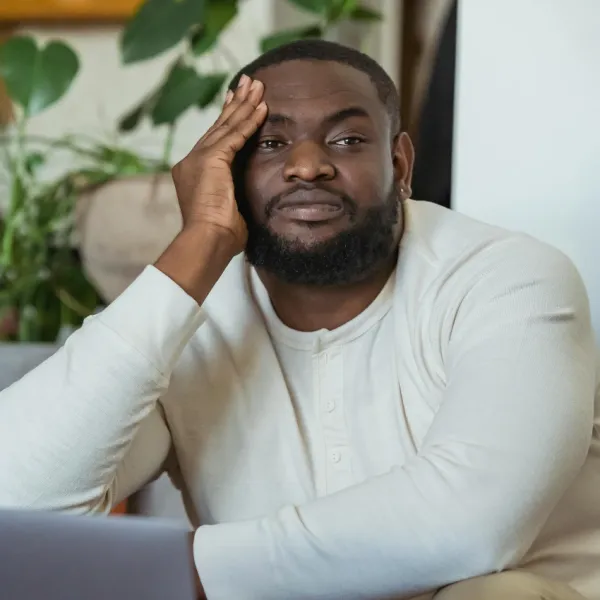
Have you been noticing that you feel constantly bored? Well, if you are searching your brain for something to do, it’s time you embraced the monotony. Science has found that boredom is actually good for you.
Boredom is commonly associated with negative traits and behaviors such as depression, impulsivity, and attention-seeking. It’s less commonly seen as something positive. But when people learn to use their boredom to their advantage, there are many great outcomes and benefits.
Is being bored actually good for you? The short answer? Yes.
Research suggests that boredom can be really good for you in small doses. Boredom, from time to time, allows your brain to recharge, but it can also stimulate creativity and problem-solving skills. Boredom allows you time to sit back and reflect on your life, yourself, and the positive changes you wish to pursue.
Kinga Howard | Unsplash
Time without distraction allows you to think. It’s as simple as that. Have you ever noticed that problems seem clearer after a shower? That’s because you are allowing your mind to simply wander. By thinking and pondering without becoming antsy or irritable, you allow your mind to explore different ideas. You may come up with a brand new business idea or writing project.
Research backs this up. According to a 2013 study, being bored allows your mind to be open and free to explore endless possibilities. Basically, boredom fosters creativity. It’s not much different than brainstorming.
: If You’re Easily Annoyed By This One Thing, Science Says You’re Basically A Creative Genius
Boredom can be used as a tool to make sure everything in your life is in check. Are you working on a project or a few different ideas? You can use this time to evaluate what needs to be done next or what should have been completed already.
What happens when you remove all distractions from immediate access except for the most boring thing you have to do at work? It suddenly becomes more interesting. This is a great way to strategically use your boredom to your advantage. Leave your phone in a locked drawer while you are trying to get a mind-numbing task done at work, and you’ll suddenly get the task done more quickly!
Sometimes, it’s even simpler than that. There are moments when your brain just needs to be bored. It needs that time staring out a window to just wander and recharge. According to Scientific American, “Downtime replenishes the brain’s stores of attention and motivation, encourages productivity and creativity, and is essential to both achieve our highest levels of performance and simply form stable memories in everyday life.”
 Keira Burton | Pexels
Keira Burton | Pexels
You can use your boredom to establish short and long-term goals. Where do you want to be in the next year or two? Where would you like to be 5-10 years from now? Boredom gives you the opportunity to reflect on your goals and/or plans as well as make revisions to any goals or plans that have already been established.
One study even determined that “Boredom is a discrete functional emotion, and serves to encourage people to seek new goals and experiences. Boredom provides a valuable adaptive function by signaling it is time to pursue a new goal… boredom will motivate the pursuit of new goals as the intensity of the current experience fades.”
: Study Finds People Who Always Reach Their Goals Often Share This One Trait, And It’s Not Willpower
According to a 2011 study, boredom can give you time to reflect on your life, relationships, and friendships, both past and present. It gives you time to see where things went right and where they went wrong.
From there, you are given the opportunity to change what went wrong for future experiences that you may come across. It gives you the chance to acknowledge your mistakes, so you’re less likely to make the same mistake twice.
 Prostock-studio | Shutterstock
Prostock-studio | Shutterstock
Boredom allows you to relax, mentally and physically. It gives your mind a break, gives your brain clarity, and removes mental clutter. Boredom allows your mind the time to wind down so you’re not always overwhelmed by racing thoughts.
When was the last time you just sat back and thought about the things in life that make you happy? When was the last time you simply revisited a moment in your childhood that brought you joy? Screen distractions steal these moments from us that boredom embraces.
Boredom can bring relaxation, and not always being “on the go” can lead to greater feelings of happiness and joy. So, rather than looking at boredom as having nothing to do, use it to create a more peaceful environment and overall life for yourself.
Our minds are constantly overrun with information thanks to technology. This is why boredom can be a safe haven in a way. It allows our brains to take a step back and turn off for a bit, which is one of the best ways to take care of our mental health.
Boredom gives you time to be at peace and relax. It also gives your mind time to recharge before tackling the rest of your day. Spend time reflecting on yourself instead of being glued to a screen, social media, or any work stress. Allow your mind to wander and daydream.
According to Sandi Mann, a chartered psychologist and author, “Daydreaming can be quite a respite and provide a brief escape from day-to-day life.”
According to Bench and Lench, boredom is what gives humans their drive for adventure and novelty-seeking. Novelty-seeking is when one is dissatisfied with the status quo and is willing to challenge established ideas and practices. When one is bored, it allows them to address the status quo and bring about change.
We can all use a little more creativity and happiness in our lives. We have this preconceived notion that boredom is always negative, but it’s not. Without boredom, there is no patience, and patience, as they say, is a virtue.
If we learn to use boredom wisely and let our minds roam, there are endless possibilities for where we might end up. Just remember, don’t excuse boredom and laziness; those are two very different things.
: Could You Win South Korea’s Space-Out Competition, Where Contestants Compete To Do Nothing For 90 Minutes?
Brittney Lindstrom is a Licensed Professional Counselor and Certified Rehabilitation Counselor.